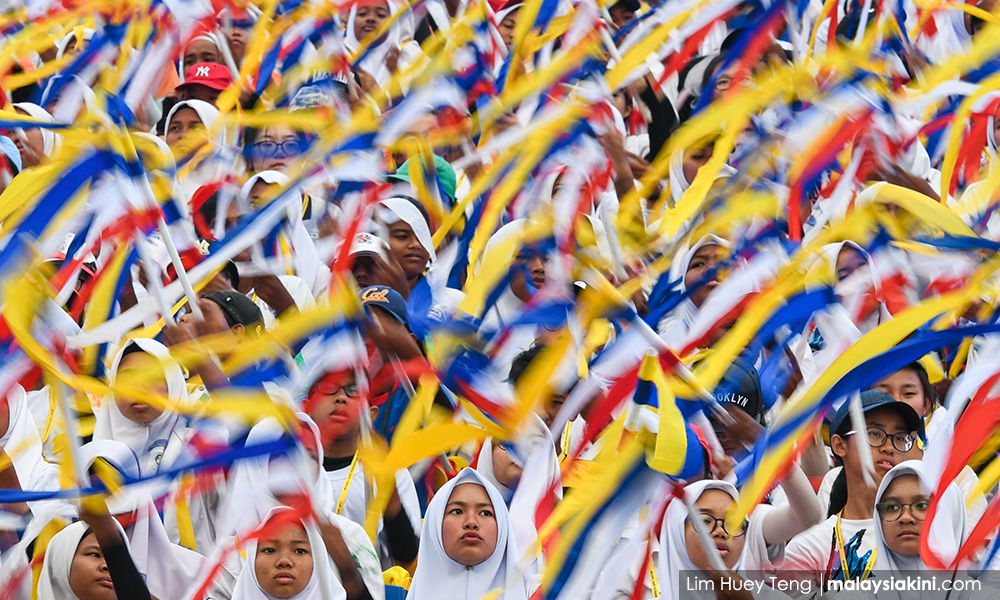
Klang is a place of chaos.
I find the banana leaf rice restaurant deep inside the city, its door wedged between colourful ornaments and godly statues stacked closely next to each other. I walk into the restaurant with my father and sit at the back.
At once two leaves cover our table and food and condiments start to fall onto the leaves like waterfalls onto a river.
At every interval, servers ask if the food was good, and if there is more that is needed. Many hands touch my shoulders, many arms stretch across and around my table, many smiles and laughter are shared with me. It feels like a family.
The boss comes over to say hi, and gives us a few meat dishes on the house. In the end, the boss personally brings the bill over and tells us he has given us a great discount because we look like first-timers.
When we walk out of the restaurant, he asks us to visit them again because he likes it when Chinese come to their restaurant. We were the only ones who were not Indians in this restaurant, and we were treated like kings.
Klang is a place of common kings.
Beyond our own skin
Having people of another race appreciate your food gives you an indescribable joy. It is the mark of cultural acceptance that sees the best in another even if they are different and unfamiliar to us. I cannot explain why I get excited when I see a Malay speak Mandarin to me.
It is surely not something that is impossible to achieve, but it still feels extraordinary every time I hear it.
Such experiences are only rewarding because it is different from what we usually experience.
Our lives have been segregated almost completely based on race and religion since the 19th century. Over time we only come to know people of our own kind, and the walls between "us" and "them" become higher and harder to climb over.
During the time of Independence in 1957, we had to choose between demolishing this wall that contained heavy cultural history, or living with the walls.
We chose the latter, but also agreed to build a common playground so that the children could come out and play with other children who were dissimilar to them.
No community sacrificed their culture or customs - we chose to be a plural society because we believed that was our greatest strength.
The promise of a plural society
Articles 3, 11, and 12 of our Federal Constitution state that Islam is the religion of the nation, but that other religions ought to be allowed to be practised and recognised by the state. There shall be no discrimination and everyone ought to be treated equal before the law.
The national language is Malay, but other languages are allowed to have their place in this country. Our fundamental liberties are to be protected under the law and this is the right of all communities.
The Rukun Negara reiterated this in more assertive terms by emphasising the multiracial nature of this society and the need to be accommodative of the thoughts and feelings of other communities.
Malaysia is a plural society, and this was recognised many times over.
But over time the walls become comfortable. You live within them and see only people within of your kind. When you see people outside of your walls, you form prejudices and stereotypes against others. Others will also retaliate with their own sets of moral judgements against you.
This is the natural order of things when you live segregated lives. You can go to school, university, work, and social activities with only people of your own kind. A Chinese person could go through his or her entire life without knowing a person from another race.
While a plural society makes sure that everyone has a place in the country, it also comes with a burden that must be confronted. That is, how do we make sure that we can build bridges across the walls so that we have a chance of seeing others without being unfairly prejudiced against them?
The bridge here is racial empathy. To be able to step into the shoes of a person of a different race and see through their eyes.
And when we are able to do that, then we would realise that beneath all the superficial differences, we are more similar than we have come to acknowledge.
We all want the same thing: we want a decent paying job, we want our children to go to university, we want a place to worship our gods, we want a place to relax and have fun, and we want a family that is close-knit and happy. We all want the same things, we just do it in different ways.
That bridge of racial empathy must be built before our walls become permanent. We still have time.
JAMES CHAI works at a law firm. His voyage in life is made less lonely with a family of deep love, friends of good humour and teachers of selfless giving. This affirms his conviction in the common goodness of people: the better angels of our nature. He tweets at @JamesJSChai.- Mkini


No comments:
Post a Comment
Note: Only a member of this blog may post a comment.